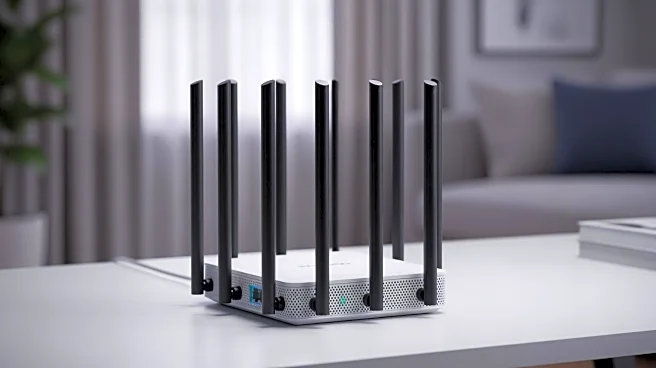What's Happening?
TP-Link has launched the Deco BE68 BE14000, a high-speed Wi-Fi 7 mesh system designed to provide extensive wireless coverage in homes. The system is available as a two or three-pack, with the three-pack offering coverage up to 8,100 square feet. The Deco BE68 operates
over three bands (2.4, 5.0, and 6.0 GHz) and is priced at $700 for the three-node setup. It features a maximum speed rating of BE14000, making it suitable for users with high-speed internet connections. The system includes advanced features such as Multi-Link Operation (MLO) for intelligent data transfer across bands, enhancing connectivity and speed.
Why It's Important?
The introduction of the Deco BE68 highlights the growing demand for high-performance home networking solutions, particularly as more households require reliable internet for remote work, streaming, and gaming. With its extensive coverage and advanced features, the Deco BE68 addresses the needs of users seeking seamless connectivity across large areas. This development is significant for the U.S. market, where high-speed internet access is increasingly essential for daily activities. The system's ability to support Wi-Fi 7 technology positions TP-Link as a competitive player in the home networking industry, offering consumers a future-proof solution.
What's Next?
As TP-Link continues to expand its range of Wi-Fi 7 products, consumers can expect further innovations that enhance home connectivity. The company may introduce additional models with varying features and price points to cater to different user needs. The adoption of Wi-Fi 7 technology is likely to accelerate, prompting other manufacturers to develop similar systems. This trend could lead to increased competition in the home networking market, driving advancements in speed, coverage, and user-friendly features.
Beyond the Headlines
The deployment of Wi-Fi 7 technology in home mesh systems like the Deco BE68 raises questions about the future of internet connectivity standards. As more devices become compatible with Wi-Fi 7, the demand for faster and more reliable networks will grow. This shift may influence internet service providers to upgrade infrastructure to support higher speeds, impacting the broader telecommunications industry. Additionally, the emphasis on seamless connectivity could lead to discussions about digital equity and access to high-speed internet across different regions.
















